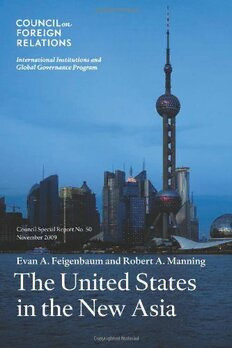
The United States in the New Asia (Council Special Report) PDF
53 Pages·2009·0.82 MB·English
Most books are stored in the elastic cloud where traffic is expensive. For this reason, we have a limit on daily download.
Preview The United States in the New Asia (Council Special Report)
Description:
For more than a decade, the United States has mostly watched from the sidelines as Asian countries organized themselves into an alphabet soup of new multilateral organizations. As groups such as ASEAN Plus Three, from which Washington is excluded, become the locus of economic and financial integration, America's traditional "hub and spokes" approach to Asia—with the United States as the hub, bilateral alliances as the spokes, and multilateral institutions largely at the margins of American policy—has become unsustainable.In this report, Evan A. Feigenbaum and Robert A. Manning review the relationship between pan-Asian and trans-Pacific institutions and suggest policy guidelines for a different U.S. approach to this new Asian landscape. A purposeful multilateralism that pools the efforts of those with the greatest capacity, the authors argue, could make Asia a more prosperous and secure region. And by leading with new ideas and vigorous multilateral economic engagement, the United States can help define new roles for itself in a changing Asia.
See more
The list of books you might like
Most books are stored in the elastic cloud where traffic is expensive. For this reason, we have a limit on daily download.
